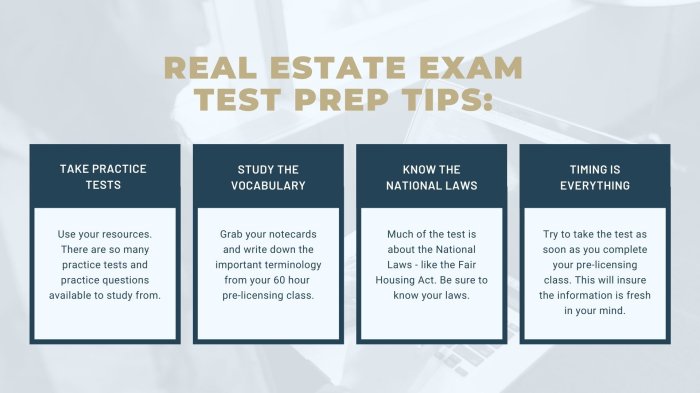Embark on an educational journey with our comprehensive guide to the Real Estate Principles Final Exam. Dive into the intricacies of property ownership, unravel the complexities of real estate contracts, navigate the world of real estate financing, and delve into the legal intricacies that govern real estate transactions.
This guide will empower you with the knowledge and insights necessary to excel in your final exam and beyond.
Property Ownership
Property ownership refers to the legal rights and interests an individual or entity holds in real estate. There are several types of property ownership, each with its own set of rights and responsibilities.
Fee Simple
Fee simple is the most complete form of property ownership. It grants the owner exclusive and perpetual rights to the property, including the land and any improvements on it. The owner has the right to use, possess, and dispose of the property as they wish, subject to any applicable laws or regulations.
Life Estate
A life estate is a type of ownership that lasts for the lifetime of the owner. Upon the owner’s death, the property reverts to the remainderman, who is typically named in the deed.
Joint Tenancy
Joint tenancy is a form of ownership where two or more people hold title to the property jointly. The owners have equal rights to use and possess the property, and upon the death of one owner, their interest passes to the surviving owner(s) by operation of law.
Legal Implications of Co-Ownership, Real estate principles final exam
Co-ownership of property can create legal complexities, including:
- Shared decision-making authority
- Potential for disputes over property use
- Liability for debts or obligations related to the property
Real Estate Contracts: Real Estate Principles Final Exam

Real estate contracts are legally binding agreements that Artikel the terms and conditions of a real estate transaction. They establish the rights and obligations of the parties involved.
Essential Elements of a Valid Contract
To be legally valid, a real estate contract must include:
- Offer and acceptance
- Consideration (exchange of value)
- Competency of the parties
- Legality of the purpose
Types of Real Estate Contracts
Common types of real estate contracts include:
- Purchase and sale agreements
- Leases
- Options
Legal Implications of Breach of Contract
Breach of a real estate contract can result in legal consequences, such as:
- Damages (monetary compensation)
- Specific performance (court order to fulfill the contract)
- Rescission (cancellation of the contract)
Real Estate Financing

Real estate financing involves obtaining funds to purchase or refinance a property. There are various types of financing options available.
Types of Real Estate Financing
Common types of real estate financing include:
- Mortgages
- Home equity loans
- Lines of credit
Process of Obtaining a Mortgage
Obtaining a mortgage typically involves:
- Application
- Underwriting (evaluation of creditworthiness)
- Closing (finalization of the loan)
Legal Implications of Defaulting on a Mortgage
Defaulting on a mortgage can have serious legal consequences, including:
- Foreclosure (loss of the property)
- Damage to credit score
- Legal liability for the outstanding balance
Essential Questionnaire
What are the different types of property ownership?
Fee simple, life estate, and joint tenancy.
What are the essential elements of a valid real estate contract?
Offer, acceptance, consideration, capacity, and legality.
What are the different types of real estate financing?
Mortgages, home equity loans, and lines of credit.
What are the legal principles governing real estate transactions?
Statute of frauds, doctrine of merger, and law of adverse possession.
What are the ethical principles that govern the conduct of real estate professionals?
Duty of loyalty, duty of confidentiality, and duty of disclosure.